By Sean Moloughney, Editor04.08.24
Developing research suggests the gut microbiome plays a starring role in the production of our overall health and wellness. Beyond digestion and immune function, trillions of microbes in the gut can influence emotional and neurological balance, metabolic health, and more.
The idea that various systems of the human body influence each other through intricate pathways and networks has been well documented. How the composition of the gut microbiota affects these bodily systems, and how to influence this composition through diet, lifestyle, or other aspects remains fertile ground for future research.
Today, the market for nutraceuticals and food products that aim to induce health through the gut offers significant allure for consumers and companies alike.
Two-thirds of adults experience recurrent digestive symptoms like gas, bloating and abdominal pain, but few seek care from their doctor, according to a 2023 survey from Ipsos and MDVIP, a membership-based healthcare network with about 1,100 primary care physicians.
Most people aren’t aware of the importance of gut health and ways to improve it, the survey suggested, with over half of respondents (52%) saying they are confused by information on diet and nutrition.
There are significant gender differences as well, with 75% of women experiencing gastrointestinal symptoms at least a few times a month compared to 57% of men. Women are more likely to feel dismissed when seeking care, the survey showed, with 38% saying their health concerns weren’t taken seriously by a doctor compared to 24% of men.
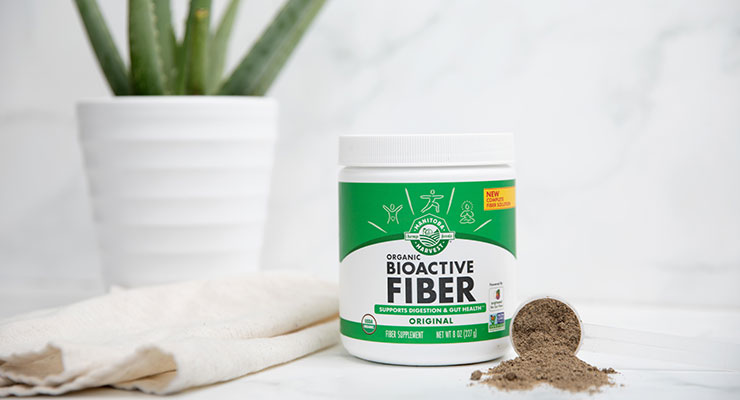
Among other issues, a lack of fiber can lead to constipation, and apparently Americans have been buying so many over-the-counter laxatives that last September (2023) the Wall Street Journal reported on the shortage of polyethylene glycol 3350 (PEG), the generic name for Miralax and Glycolax.
Data from analytics company Pattern indicated searches for laxative pills on Amazon more than tripled in the past year, the WSJ article noted, and fiber supplements Metamucil and Benefiber have reported double-digit sales growth in recent years.
Why are Americans buying so many laxatives? In addition to an aging population that’s more likely to have constipation issues, the WSJ said psychologists noted “Some people are treating laxatives like a budget Ozempic to feel skinnier.” Cue TikTok and other social media platforms that fuel rapid buying behaviors.
Beyond products like Metamucil, fiber supplements in formats like gummies, powders, and capsules, along with fortified snack foods and drinks, continue to offer consumers a menu of new product options.
On the supplement front, Manitoba Harvest, a Certified B Corporation specializing in hemp foods—and a wholly-owned subsidiary of Tilray Brands, Inc. (NASDAQ: TLRY)—has partnered with bioactives company Brightseed to develop Manitoba Harvest Bioactive Fiber.
Now exclusively available at Whole Foods Market stores nationwide, the ready-to mix powder provides 6 grams of both soluble and insoluble fiber per serving and features Brightseed’s Bio Gut Fiber, a novel ingredient made from upcycled hemp hulls, the outer shells of hemp seeds. The product is certified organic, Non-GMO Project Verified, Kosher, and vegan.
“With the debut of Manitoba Harvest Bioactive Fiber, we’re not just introducing a product; we’re rediscovering the nutritional capacity of hemp after nearly 70 years in the dark,” said Jared Simon, president of Manitoba Harvest and Tilray Wellness. “Bioactives are gaining huge strides in nutrition science but are largely undiscovered and remain underutilized in health foods.”
Luc Maes, ND, who has a naturopathic medicine practice in Santa Barbara, CA, is focused on microbiome wellness, offering a functional and personalized approach to health. He’s also the co-founder of Kaibae, whose mission is to utilize wild plants like baobab, known as the “tree of life” where it grows in Northern Ghana, to improve health and beauty while advancing social good and preserving biodiversity.
The company offers organic baobab fruit powder as well as a line of dietary supplements that target gut/skin resilience, gut/lung resilience, and stress with prebiotics, probiotics, herbal extracts, and other natural ingredients.
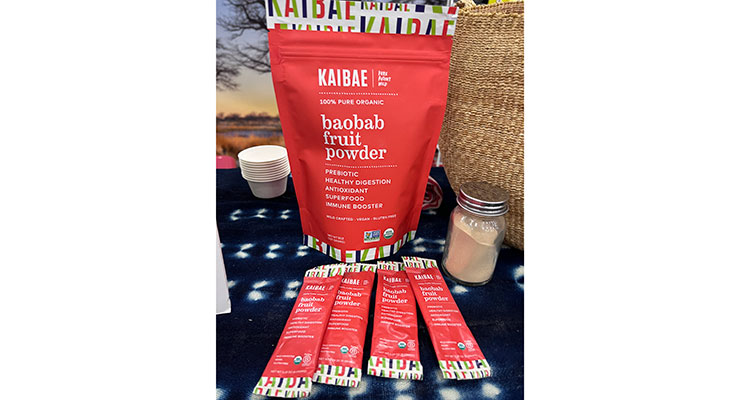
Prebiotics are a category of non-digestible compounds considered to be substrates that nourish good bacteria in the gut to offer a health benefit. They help support, feed, balance, or optimize good bacteria.
Prebiotic sodas from companies like Olipop and Poppi have been outpacing conventional soda sales while also introducing consumers to fiber-fortified drink options that align with their regular routines.
NextFoods recently debuted GoodBelly Organic Prebiotic Sparkling Water, which features prebiotics from organic blue agave to provide a good source of fiber (3 grams) with no added sugar (20 calories or less).
Probiotics are live microorganisms that when administered in adequate amounts confer a health benefit on the host. Divided into genus, species, and strain, the most common types of probiotics are mainly from the genera Bifidobacteria and Lactobacilli. Scientists and industry experts continue to emphasize that each probiotic strain has unique properties.
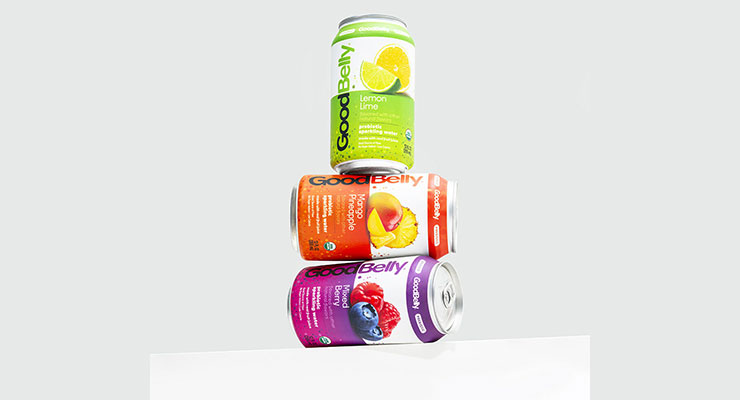
U.S. consumers primarily associate probiotics with gut health/digestion, but immunity continues to rise, according to 2023 survey data from Industry Transparency Center (ITC). “We’re also seeing an increase in microbiome health awareness,” said ITC CEO Len Monheit. “Females are more aware of a variety of benefits. This is due in part to mainstream media coverage which tends to appear more in female-focused outlets.”
Jordi Riera, chief business officer at Kaneka Probiotics, said it’s becoming increasingly clear that probiotics can do much more than just gut modulation. “In my opinion, that’s where the opportunity lies, and where precision probiotics come in.”
Sometimes referred to as “next-generation” or “condition-specific” probiotics, precision probiotics balance the gut microbiome while also targeting specific health areas, Riera said. Advanced screening tools can help identify certain traits and mechanisms of action that may influence specific pathways in the gut, he added.
Another leg of the stool, postbiotics are the metabolites or end products that result from fermentation and digestion. They are inanimate or inactivated microbes that may include, for example, vitamins B and K, amino acids, and short-chain fatty acids (SCFA) like acetate, propionate, and butyrate.
According to ITC data, among U.S. consumers who take postbiotics, the most common benefits sought include immune health, overall digestive support, and regularity, followed by inflammation management/reduction, colon health, skin health, and microbiome health.
Gaia Herbs has debuted a new full spectrum postbiotics supplement line for digestive health. Made with organic fermented juice extract from traditional foods, varieties include Ginger-Turmeric, Sauerkraut, and Ginger-Beet. Each 2-capsule serving contains 3 billion postbiotic cells and doesn’t require refrigeration, according to the company.
Among other gut health supplements, Gaia Herbs also offers Gut Revival, which contains 50 mg of AstraGin, a branded blend of Astragalus membranaceus and Panax notoginseng root extracts, to support healthy intestinal permeability. Each capsule also includes an herbal blend of gotu kola leaf, jujube date fruit and seed, lemon balm aerial parts, and chamomile flowers.
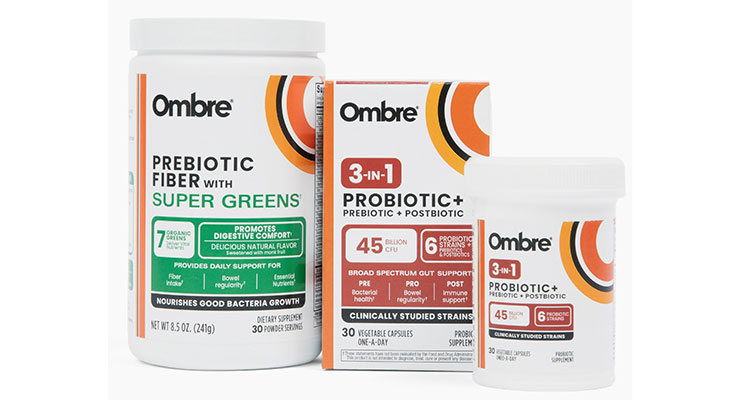
“Gut health is intricately linked to various aspects of our overall health and continues to draw the attention of the scientific community as well as consumers,” said Riera. “It’s widely accepted that a healthy gut microbiome plays a crucial role in supporting various biological functions in the human body. At the same time, dysbiosis or an imbalance of microbes and lack of microbial diversity, has been linked to a range of health issues beyond the gastrointestinal organs, including cardiovascular, metabolic, and immune conditions.”
Gut microbes—shaped by genetics, our environment, and the foods and drugs we ingest—produce a variety of metabolites that influence health. Microbiota synthesize the neurotransmitter serotonin, which influences mood and metabolic health, and ferment fiber into SCFAs that can lower inflammation.
The gut-brain axis (GBA) allows for bidirectional communication between the central nervous system (CNS)—consisting of the brain and spinal cord—and the enteric nervous system (ENS), which regulates gastrointestinal function.
Recent research has described the importance of gut microbiota in influencing this interaction and implications for health. For example gut microbiota imbalances occur in some neurological disorders including Alzheimer’s disease, Parkinson’s disease, autism spectrum disorder, epilepsy, and major depressive disorder.
Meanwhile, mental stress has been associated with gastrointestinal conditions like irritable bowel syndrome (IBS). Researchers continue to evaluate how stress might reshape the gut microbiome, which could lead to targeted therapies for rebalancing the microbiota composition.
Already, dietary supplements are targeting the GBA pathway. For example, Garden of Life’s Dr. Formulated Probiotics Mood+ contains 16 probiotic strains (50 billion CFU), 350 mg of ashwagandha and blueberries, and a 675 mg prebiotic fiber blend. The product claims to promote emotional wellbeing, and support digestive balance.
At-home gut-microbiome tests from companies like Viome and ZOE have gained attention for their ability to identify which “good” and “bad” bugs are inhabiting people’s intestines.
Ombre, a late-seed-stage venture that launched in 2021, aims to empower people to take control of their health with actionable lifestyle, diet, and supplement recommendations based on real data from a personalized gut microbiome report that’s available without a prescription.
The company recently debuted its latest digestive health products: a 3-in-1 Probiotic + Prebiotic and Postbiotic, as well as Prebiotic Fiber with SuperGreens.
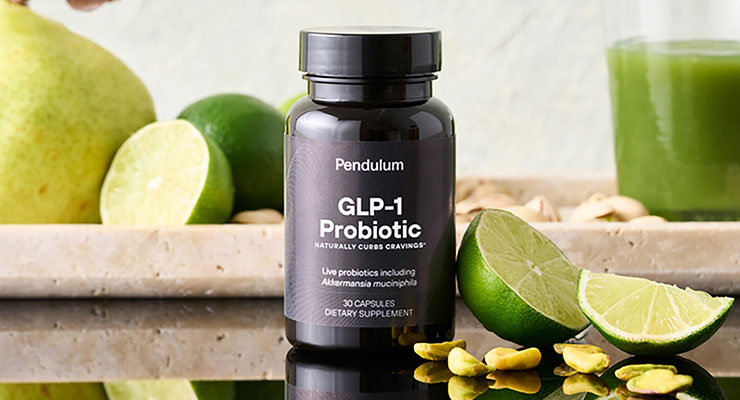
Importantly, there is no “nature’s Ozempic” or “budget Ozempic,” as some social media influencers have suggested. Overdosing on laxatives isn’t healthy either.
Nutraceutical companies are adapting to this new era by offering products designed to address the makeup of the gut microbiome in an effort to influence metabolic health.
For example, the biotech company Pendulum Therapeutics, launched its GLP-1 Probiotic in March. The company said its product is formulated with beneficial bacterial strains known to stimulate GLP-1 production (based on preclinical studies), and reduce appetite and cravings. These strains include: Akkermansia muciniphila, which secretes propionate and P9 to induce GLP-1 production; Clostridium butyricum, which produces butyrate to stimulate GLP-1; Bifidobacterium infantis, which produces acetate and interacts with Akkermansia; and Butyricum to promote an ecosystem in the gut that naturally boosts GLP-1.
According to the company, participants in GLP-1 Probiotic consumer research reported significant reduction in food cravings after 3 months. Nine in 10 (91%) reported reduced overall food cravings and 88% reported reduced sugar cravings.
Meanwhile, a study published in Nature Metabolism (February 2024) showed that intake of resistant starch, a kind of fermentable dietary fiber, facilitates weight loss by reshaping the gut microbiota. The randomized, placebo-controlled, crossover trial included 37 participants with overweight or obesity, and found 40 grams of resistant starch supplementation for 8 weeks can help to achieve weight loss (mean −2.8 kg) and improve insulin resistance in individuals with excess body weight.
Supergut Founder and CEO Marc Washington said that gut health is foundational to metabolic health, during a panel discussion on weight loss in the Ozempic era at Natural Products Expo West this year.
The company, which offers “gut healthy prebiotic shakes” that deliver 15 grams of fiber and 15 grams of protein, has also introduced its GLP-1 Booster featuring a resistant starch fiber blend that includes soluble corn fiber, green banana powder, and Solnul resistant potato starch.
Alongside many other health functions, Washington noted that fiber protects muscle mass during weight loss.
About the Author: Sean Moloughney has been the Editor of Nutraceuticals World since 2012. He can be reached at smoloughney@rodmanmedia.com
The idea that various systems of the human body influence each other through intricate pathways and networks has been well documented. How the composition of the gut microbiota affects these bodily systems, and how to influence this composition through diet, lifestyle, or other aspects remains fertile ground for future research.
Today, the market for nutraceuticals and food products that aim to induce health through the gut offers significant allure for consumers and companies alike.
Concerned Consumers
Digestive health remains a top issue for U.S. consumers. It can be obvious when the digestive system is off track, but other times people ignore symptoms or accept and normalize them.Two-thirds of adults experience recurrent digestive symptoms like gas, bloating and abdominal pain, but few seek care from their doctor, according to a 2023 survey from Ipsos and MDVIP, a membership-based healthcare network with about 1,100 primary care physicians.
Most people aren’t aware of the importance of gut health and ways to improve it, the survey suggested, with over half of respondents (52%) saying they are confused by information on diet and nutrition.
There are significant gender differences as well, with 75% of women experiencing gastrointestinal symptoms at least a few times a month compared to 57% of men. Women are more likely to feel dismissed when seeking care, the survey showed, with 38% saying their health concerns weren’t taken seriously by a doctor compared to 24% of men.

The Fiber Chasm
Dietary fiber is essential for supporting gut health, including digestion, bowel regularity, weight management, and overall metabolic health. In the U.S. though, the “fiber gap” is more of a canyon. With a typical calorie-dense and nutrient-deficient Western diet, an estimated 95% of Americans don’t consume the recommended daily intake of fiber (25 grams for women and 38 grams for men up to age 50).Among other issues, a lack of fiber can lead to constipation, and apparently Americans have been buying so many over-the-counter laxatives that last September (2023) the Wall Street Journal reported on the shortage of polyethylene glycol 3350 (PEG), the generic name for Miralax and Glycolax.
Data from analytics company Pattern indicated searches for laxative pills on Amazon more than tripled in the past year, the WSJ article noted, and fiber supplements Metamucil and Benefiber have reported double-digit sales growth in recent years.
Why are Americans buying so many laxatives? In addition to an aging population that’s more likely to have constipation issues, the WSJ said psychologists noted “Some people are treating laxatives like a budget Ozempic to feel skinnier.” Cue TikTok and other social media platforms that fuel rapid buying behaviors.
Beyond products like Metamucil, fiber supplements in formats like gummies, powders, and capsules, along with fortified snack foods and drinks, continue to offer consumers a menu of new product options.
On the supplement front, Manitoba Harvest, a Certified B Corporation specializing in hemp foods—and a wholly-owned subsidiary of Tilray Brands, Inc. (NASDAQ: TLRY)—has partnered with bioactives company Brightseed to develop Manitoba Harvest Bioactive Fiber.
Now exclusively available at Whole Foods Market stores nationwide, the ready-to mix powder provides 6 grams of both soluble and insoluble fiber per serving and features Brightseed’s Bio Gut Fiber, a novel ingredient made from upcycled hemp hulls, the outer shells of hemp seeds. The product is certified organic, Non-GMO Project Verified, Kosher, and vegan.
“With the debut of Manitoba Harvest Bioactive Fiber, we’re not just introducing a product; we’re rediscovering the nutritional capacity of hemp after nearly 70 years in the dark,” said Jared Simon, president of Manitoba Harvest and Tilray Wellness. “Bioactives are gaining huge strides in nutrition science but are largely undiscovered and remain underutilized in health foods.”
Luc Maes, ND, who has a naturopathic medicine practice in Santa Barbara, CA, is focused on microbiome wellness, offering a functional and personalized approach to health. He’s also the co-founder of Kaibae, whose mission is to utilize wild plants like baobab, known as the “tree of life” where it grows in Northern Ghana, to improve health and beauty while advancing social good and preserving biodiversity.
The company offers organic baobab fruit powder as well as a line of dietary supplements that target gut/skin resilience, gut/lung resilience, and stress with prebiotics, probiotics, herbal extracts, and other natural ingredients.

A New Biotics Menu
Prebiotics, probiotics, and postbiotics have helped diversify the gut-health product marketplace.Prebiotics are a category of non-digestible compounds considered to be substrates that nourish good bacteria in the gut to offer a health benefit. They help support, feed, balance, or optimize good bacteria.
Prebiotic sodas from companies like Olipop and Poppi have been outpacing conventional soda sales while also introducing consumers to fiber-fortified drink options that align with their regular routines.
NextFoods recently debuted GoodBelly Organic Prebiotic Sparkling Water, which features prebiotics from organic blue agave to provide a good source of fiber (3 grams) with no added sugar (20 calories or less).
Probiotics are live microorganisms that when administered in adequate amounts confer a health benefit on the host. Divided into genus, species, and strain, the most common types of probiotics are mainly from the genera Bifidobacteria and Lactobacilli. Scientists and industry experts continue to emphasize that each probiotic strain has unique properties.

U.S. consumers primarily associate probiotics with gut health/digestion, but immunity continues to rise, according to 2023 survey data from Industry Transparency Center (ITC). “We’re also seeing an increase in microbiome health awareness,” said ITC CEO Len Monheit. “Females are more aware of a variety of benefits. This is due in part to mainstream media coverage which tends to appear more in female-focused outlets.”
Jordi Riera, chief business officer at Kaneka Probiotics, said it’s becoming increasingly clear that probiotics can do much more than just gut modulation. “In my opinion, that’s where the opportunity lies, and where precision probiotics come in.”
Sometimes referred to as “next-generation” or “condition-specific” probiotics, precision probiotics balance the gut microbiome while also targeting specific health areas, Riera said. Advanced screening tools can help identify certain traits and mechanisms of action that may influence specific pathways in the gut, he added.
Another leg of the stool, postbiotics are the metabolites or end products that result from fermentation and digestion. They are inanimate or inactivated microbes that may include, for example, vitamins B and K, amino acids, and short-chain fatty acids (SCFA) like acetate, propionate, and butyrate.
According to ITC data, among U.S. consumers who take postbiotics, the most common benefits sought include immune health, overall digestive support, and regularity, followed by inflammation management/reduction, colon health, skin health, and microbiome health.
Gaia Herbs has debuted a new full spectrum postbiotics supplement line for digestive health. Made with organic fermented juice extract from traditional foods, varieties include Ginger-Turmeric, Sauerkraut, and Ginger-Beet. Each 2-capsule serving contains 3 billion postbiotic cells and doesn’t require refrigeration, according to the company.
Among other gut health supplements, Gaia Herbs also offers Gut Revival, which contains 50 mg of AstraGin, a branded blend of Astragalus membranaceus and Panax notoginseng root extracts, to support healthy intestinal permeability. Each capsule also includes an herbal blend of gotu kola leaf, jujube date fruit and seed, lemon balm aerial parts, and chamomile flowers.

Microbiota and the Gut-Brain-Axis
Meanwhile, scientific understanding that trillions of bacteria, archaea, viruses, and fungi live in our digestive tract, and that everyone has a unique microbiota composition, has widened the purview of gut health.“Gut health is intricately linked to various aspects of our overall health and continues to draw the attention of the scientific community as well as consumers,” said Riera. “It’s widely accepted that a healthy gut microbiome plays a crucial role in supporting various biological functions in the human body. At the same time, dysbiosis or an imbalance of microbes and lack of microbial diversity, has been linked to a range of health issues beyond the gastrointestinal organs, including cardiovascular, metabolic, and immune conditions.”
Gut microbes—shaped by genetics, our environment, and the foods and drugs we ingest—produce a variety of metabolites that influence health. Microbiota synthesize the neurotransmitter serotonin, which influences mood and metabolic health, and ferment fiber into SCFAs that can lower inflammation.
The gut-brain axis (GBA) allows for bidirectional communication between the central nervous system (CNS)—consisting of the brain and spinal cord—and the enteric nervous system (ENS), which regulates gastrointestinal function.
Recent research has described the importance of gut microbiota in influencing this interaction and implications for health. For example gut microbiota imbalances occur in some neurological disorders including Alzheimer’s disease, Parkinson’s disease, autism spectrum disorder, epilepsy, and major depressive disorder.
Meanwhile, mental stress has been associated with gastrointestinal conditions like irritable bowel syndrome (IBS). Researchers continue to evaluate how stress might reshape the gut microbiome, which could lead to targeted therapies for rebalancing the microbiota composition.
Already, dietary supplements are targeting the GBA pathway. For example, Garden of Life’s Dr. Formulated Probiotics Mood+ contains 16 probiotic strains (50 billion CFU), 350 mg of ashwagandha and blueberries, and a 675 mg prebiotic fiber blend. The product claims to promote emotional wellbeing, and support digestive balance.
At-home gut-microbiome tests from companies like Viome and ZOE have gained attention for their ability to identify which “good” and “bad” bugs are inhabiting people’s intestines.
Ombre, a late-seed-stage venture that launched in 2021, aims to empower people to take control of their health with actionable lifestyle, diet, and supplement recommendations based on real data from a personalized gut microbiome report that’s available without a prescription.
The company recently debuted its latest digestive health products: a 3-in-1 Probiotic + Prebiotic and Postbiotic, as well as Prebiotic Fiber with SuperGreens.

Metabolic Health
Ozempic and other new glucagon-like peptide-1 (GLP-1) agonist medications have changed the game for weight loss, blood sugar management, and overall metabolic health.Importantly, there is no “nature’s Ozempic” or “budget Ozempic,” as some social media influencers have suggested. Overdosing on laxatives isn’t healthy either.
Nutraceutical companies are adapting to this new era by offering products designed to address the makeup of the gut microbiome in an effort to influence metabolic health.
For example, the biotech company Pendulum Therapeutics, launched its GLP-1 Probiotic in March. The company said its product is formulated with beneficial bacterial strains known to stimulate GLP-1 production (based on preclinical studies), and reduce appetite and cravings. These strains include: Akkermansia muciniphila, which secretes propionate and P9 to induce GLP-1 production; Clostridium butyricum, which produces butyrate to stimulate GLP-1; Bifidobacterium infantis, which produces acetate and interacts with Akkermansia; and Butyricum to promote an ecosystem in the gut that naturally boosts GLP-1.
According to the company, participants in GLP-1 Probiotic consumer research reported significant reduction in food cravings after 3 months. Nine in 10 (91%) reported reduced overall food cravings and 88% reported reduced sugar cravings.
Meanwhile, a study published in Nature Metabolism (February 2024) showed that intake of resistant starch, a kind of fermentable dietary fiber, facilitates weight loss by reshaping the gut microbiota. The randomized, placebo-controlled, crossover trial included 37 participants with overweight or obesity, and found 40 grams of resistant starch supplementation for 8 weeks can help to achieve weight loss (mean −2.8 kg) and improve insulin resistance in individuals with excess body weight.
Supergut Founder and CEO Marc Washington said that gut health is foundational to metabolic health, during a panel discussion on weight loss in the Ozempic era at Natural Products Expo West this year.
The company, which offers “gut healthy prebiotic shakes” that deliver 15 grams of fiber and 15 grams of protein, has also introduced its GLP-1 Booster featuring a resistant starch fiber blend that includes soluble corn fiber, green banana powder, and Solnul resistant potato starch.
Alongside many other health functions, Washington noted that fiber protects muscle mass during weight loss.
About the Author: Sean Moloughney has been the Editor of Nutraceuticals World since 2012. He can be reached at smoloughney@rodmanmedia.com













